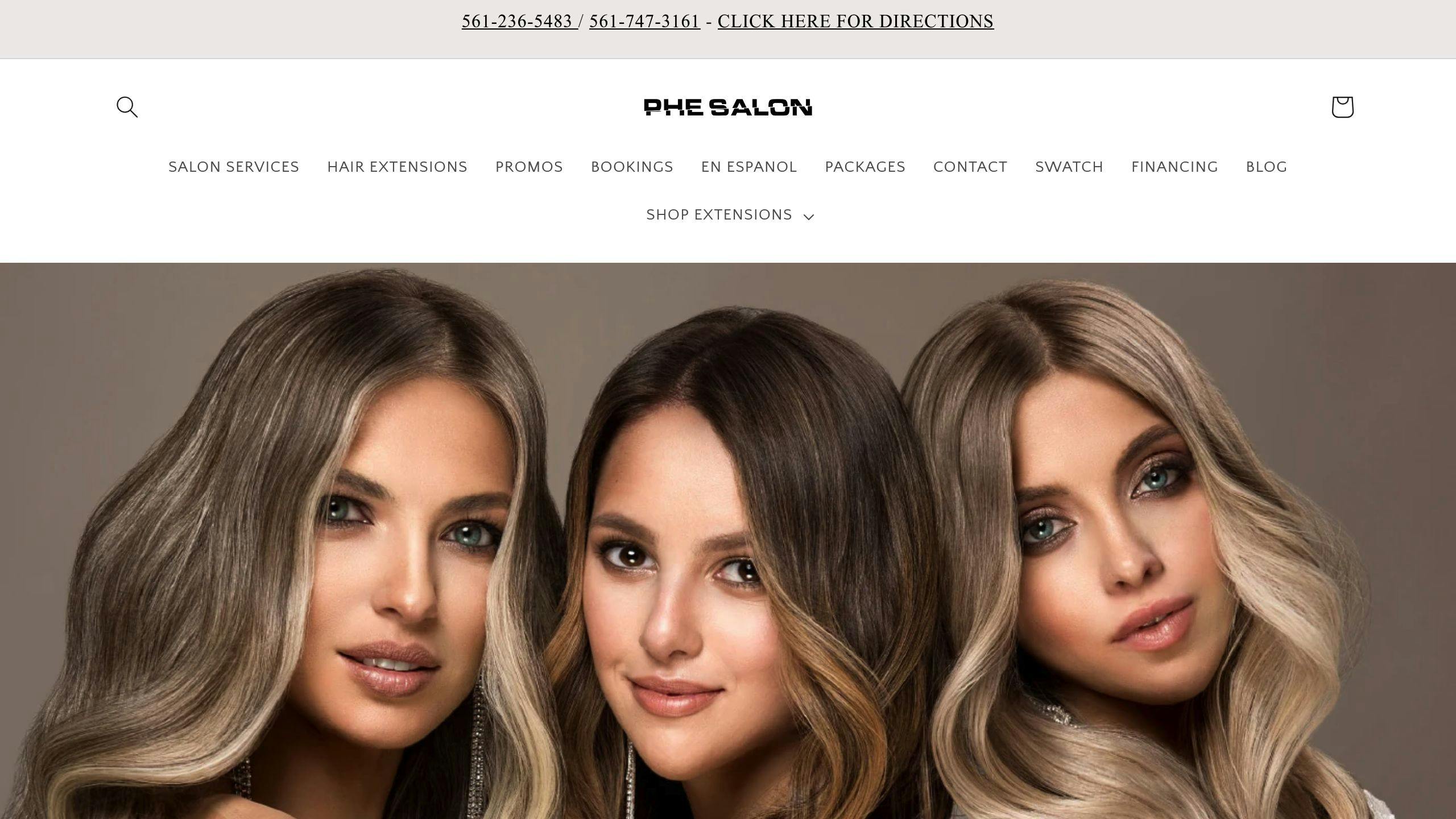Ethical sourcing in the hair extensions industry ensures hair is collected fairly, donors are paid properly, and supply chains are transparent. This matters because unethical practices - like exploitation of workers and unclear sourcing - are still common. Here's a quick breakdown:
-
Key Benefits:
- Donors: Fair pay and voluntary participation.
- Consumers: Better quality and transparency.
- Environment: Reduced waste and sustainable practices.
-
Challenges:
- Complex supply chains make tracking origins difficult.
- Donors in vulnerable regions often face exploitation.
- Harmful industry practices like chemical treatments and waste.
Some companies are leading the way with ethical practices. For example:
- Atelier Extensions sources directly from Brazil and manufactures locally in NYC.
- PHE Salon conducts supplier audits and ensures fair trade compliance.
To support ethical sourcing, choose brands with transparent policies, certifications (like Fair Trade), and direct supplier partnerships. Ask key questions like: Where does the hair come from? How are donors compensated?
Barriers to Ethical Sourcing in Hair Extensions
Complex and Hidden Supply Chains
The journey of hair from donor to end product often involves multiple intermediaries and a lack of clear documentation. This makes it tough to track where the hair comes from or confirm claims of ethical sourcing. Both manufacturers and distributors face challenges in ensuring fair practices throughout the supply chain.
Exploitation of Donors and Laborers
In regions with high economic vulnerability, donors and workers often endure low wages, unsafe working conditions, and even coercion. Many also lack legal protections, exposing them to further exploitation. These issues are especially prevalent in less developed areas, where economic hardship increases the risk of unethical practices.
Harmful and Unsafe Industry Practices
The industry faces challenges like synthetic materials contributing to waste, chemical treatments harming the environment, and excessive water usage. On top of that, unhygienic handling and poor quality control can compromise both safety and product standards.
Some companies are tackling these issues by introducing certification programs and building direct partnerships with suppliers. These efforts aim to encourage fairer practices and greater accountability within the industry [1] [2].
Changing lives through Opportunity, Ethics, Fair Trade, and Hair
Core Practices for Ethical Sourcing in Hair Extensions
The hair extension industry faces challenges, but there are ways to improve sourcing practices to make them more ethical and responsible.
Fair Pay and Respect for Donors
Some companies, like Atelier Extensions, prioritize ethical sourcing by working directly with donors. They ensure donors receive fair compensation, operate under safe conditions, and follow proper consent protocols [1]. Keeping detailed transaction records further builds trust and ensures accountability throughout the process.
Transparency and Certifications
Transparency in the supply chain is critical. Companies such as CanadaHair.ca have adopted Vendor Codes of Conduct, which help track the origin of hair, enforce fair labor standards, and document payments to donors [3].
Certifications also play a role in assuring consumers of ethical practices. For instance, kosher certification ensures compliance with specific ethical and quality benchmarks. Atelier Extensions' kosher certification is one example of how companies can demonstrate their commitment to verified ethical standards [1].
Eco-Friendly Sourcing Methods
Sourcing responsibly is not just about ethics - it also includes reducing environmental impact. Eco-friendly approaches emphasize responsible collection, sustainable processing, and minimizing waste.
For example, Noelle Salon in Boston collaborates with Indian suppliers who focus on both fair trade practices and environmental care [2]. These partnerships show an increasing effort within the industry to combine ethical sourcing with environmental awareness.
sbb-itb-4220d4e
How to Choose Ethically Sourced Hair Extensions
Making informed choices about hair extensions not only ensures quality but also supports ethical practices in the industry.
Researching Brands and Their Policies
Start by reviewing a brand's website for clear details about their sourcing practices. Look for information on where the hair comes from, how donors are compensated, and how the supply chain is managed. For instance, Atelier Extensions is known for sourcing hair from Brazil and maintaining its own manufacturing facilities [1].
Once you've found brands that seem transparent, don't hesitate to reach out and ask specific questions to verify their claims.
Questions to Ask Before Buying
When speaking with salons or retailers, asking the right questions can help you make ethical and informed decisions. Here's a quick guide:
| Key Questions | Why It Matters |
|---|---|
| Where does the hair originate from? | Helps ensure sourcing transparency |
| How are donors compensated? | Confirms fair trade and ethical practices |
| Which certifications do you hold? | Validates the company's ethical claims |
Checking for Ethical Certifications
Certifications are a reliable way to confirm a company's commitment to ethical sourcing. Look for well-known standards like:
- Fair Trade Certification: Guarantees fair pay and ethical labor conditions.
- ISO Certifications: Confirms adherence to quality management standards.
Trustworthy companies will gladly provide documentation for their certifications and discuss their sourcing practices openly. Be cautious if a company is vague or unwilling to share this information.
PHE Salon in Jupiter, Florida: A Case Study in Ethical Sourcing

How PHE Salon Ensures Ethical Sourcing
PHE Salon takes ethical sourcing seriously by conducting supplier audits, maintaining strict quality checks, and confirming the origins of the hair they use. They work only with suppliers who follow fair trade practices, aligning with recognized industry standards.
What sets them apart is their commitment to transparency. During consultations, the salon openly shares details about their sourcing process. They also maintain regular communication with suppliers to ensure these ethical practices are consistently upheld.
Services Offered by PHE Salon
PHE Salon offers a range of hair extension services that highlight their dedication to quality and ethical practices. Here’s a look at their options:
| Extension Type | Features |
|---|---|
| Human Organic | 100% natural and sustainably sourced |
| Human Remy | High-quality, tangle-resistant, and long-lasting |
| Custom Installations | Microlinks, keratin tips, and hand-tied wefts for tailored solutions |
| Bio-tape Options | Gentle on natural hair and professionally applied |
Learn More About PHE Salon
The skilled team at PHE Salon specializes in providing hair extension services that prioritize ethical sourcing. Clients can book personalized consultations to explore their options and learn more about the salon's sourcing practices directly on their website.
Conclusion: Supporting Ethical Sourcing in Hair Extensions
Key Takeaways
The hair extensions industry has long faced issues such as unclear supply chains and worker mistreatment. But there’s progress: certifications like Fair Trade and ISO standards, along with a focus on transparency, are helping reshape the industry. Many brands and salons are adopting stricter sourcing protocols and considering environmental impacts, showing a shift toward more responsible practices.
Promoting Ethical Change
Changing the industry for the better requires teamwork. Consumers, suppliers, and salons all play a role in making sustainable practices the norm. Shoppers can push for change by choosing brands that are open about their sourcing and have proper certifications. Salons can work with ethical suppliers and clearly communicate their sourcing methods.
The rising demand for responsibly sourced hair extensions shows that doing the right thing can also make good business sense. Salons like PHE Salon highlight how businesses can prioritize ethical sourcing without sacrificing quality. Their approach sets a standard for the industry, proving that transparency and ethical practices benefit both businesses and customers.
Here’s how stakeholders can contribute:
- Consumers: Look into brands and check for certifications.
- Salons: Build relationships with ethical suppliers and be open about sourcing.
- Suppliers: Commit to fair practices and provide proper documentation.
As discussed throughout this guide, tackling the industry's challenges requires ongoing effort from everyone involved. The future of ethical sourcing in hair extensions hinges on staying committed to transparency, fairness, and accountability.

